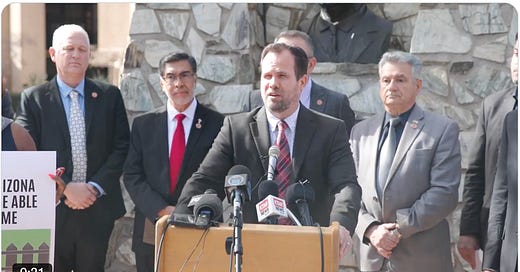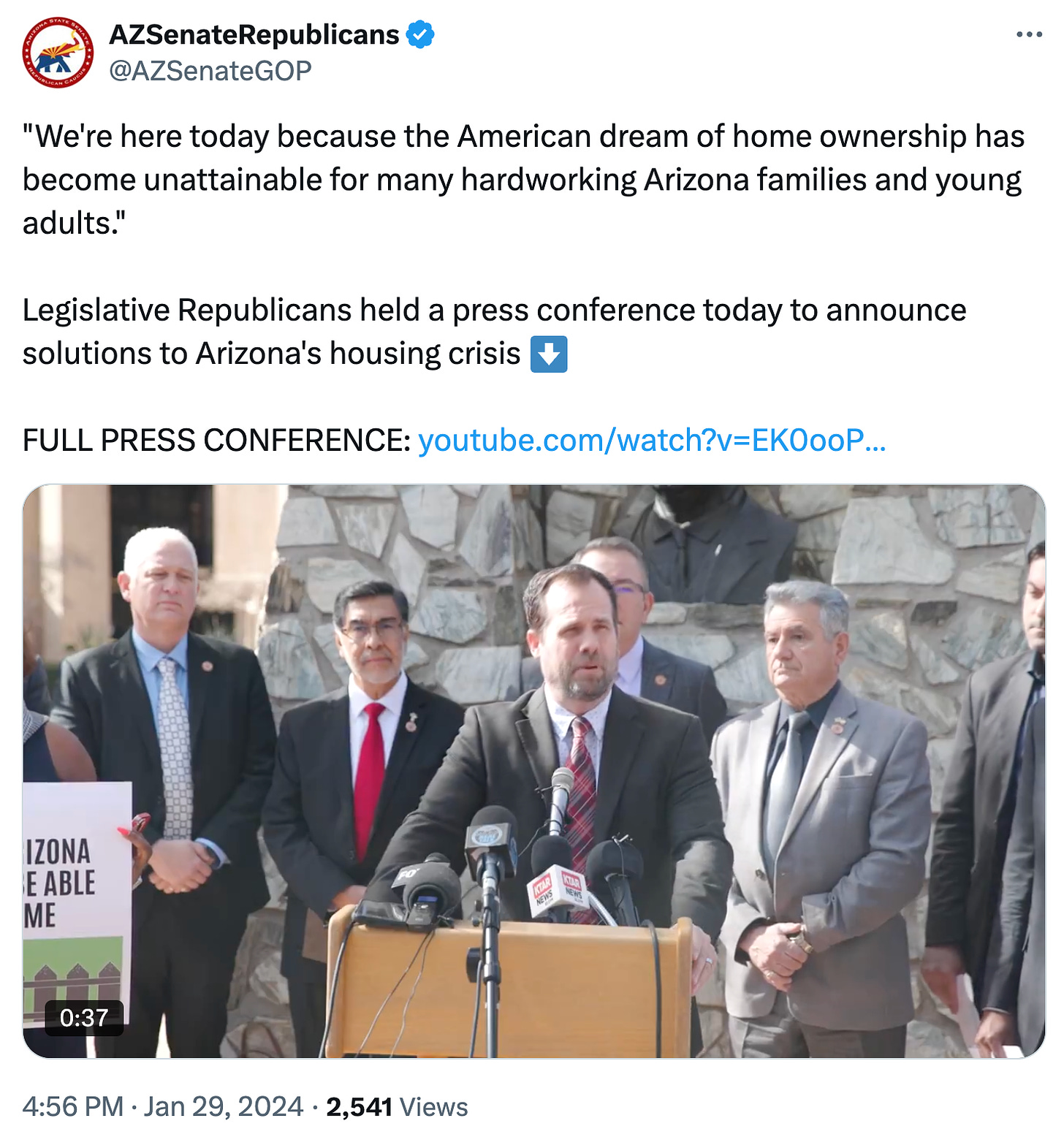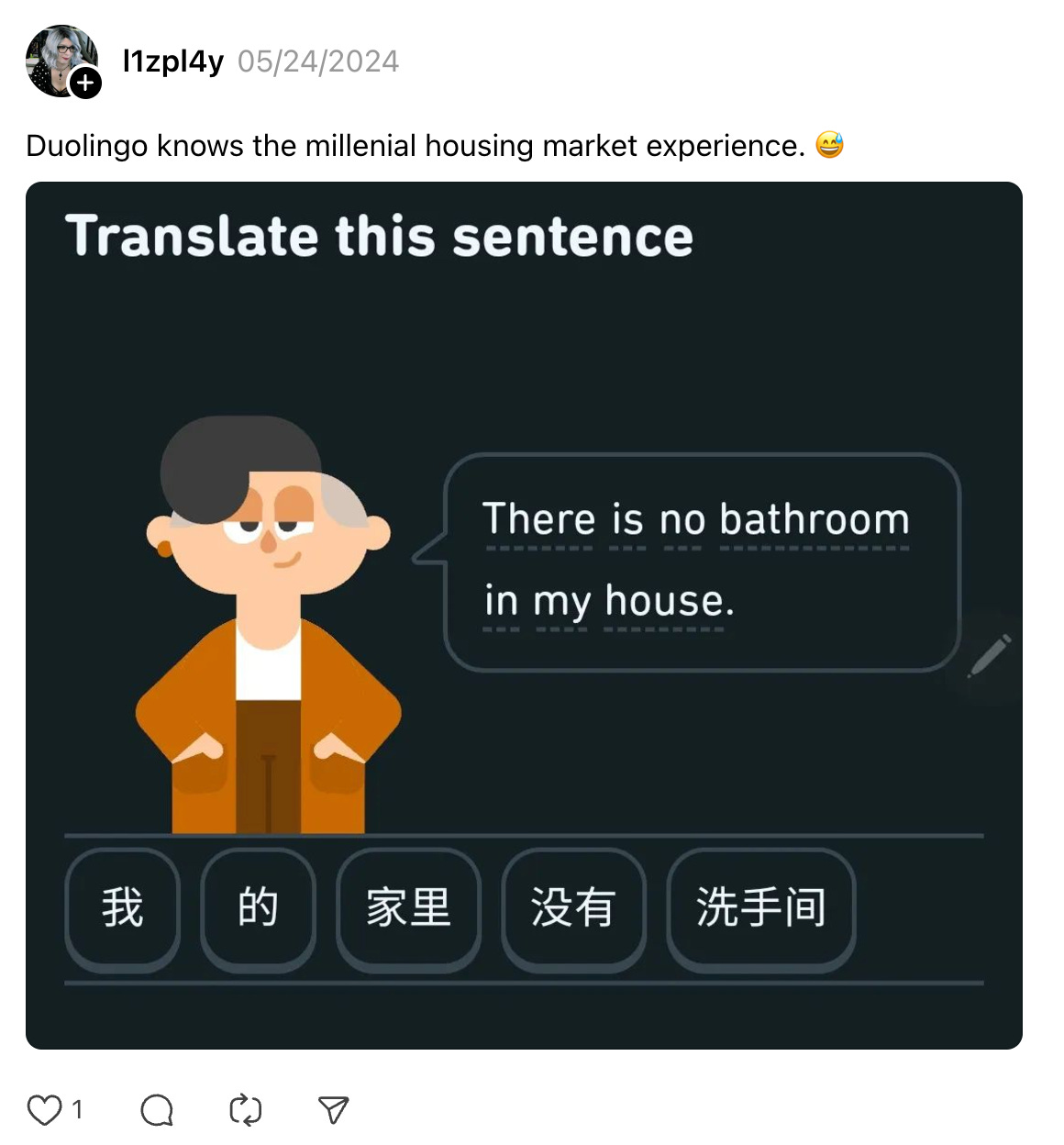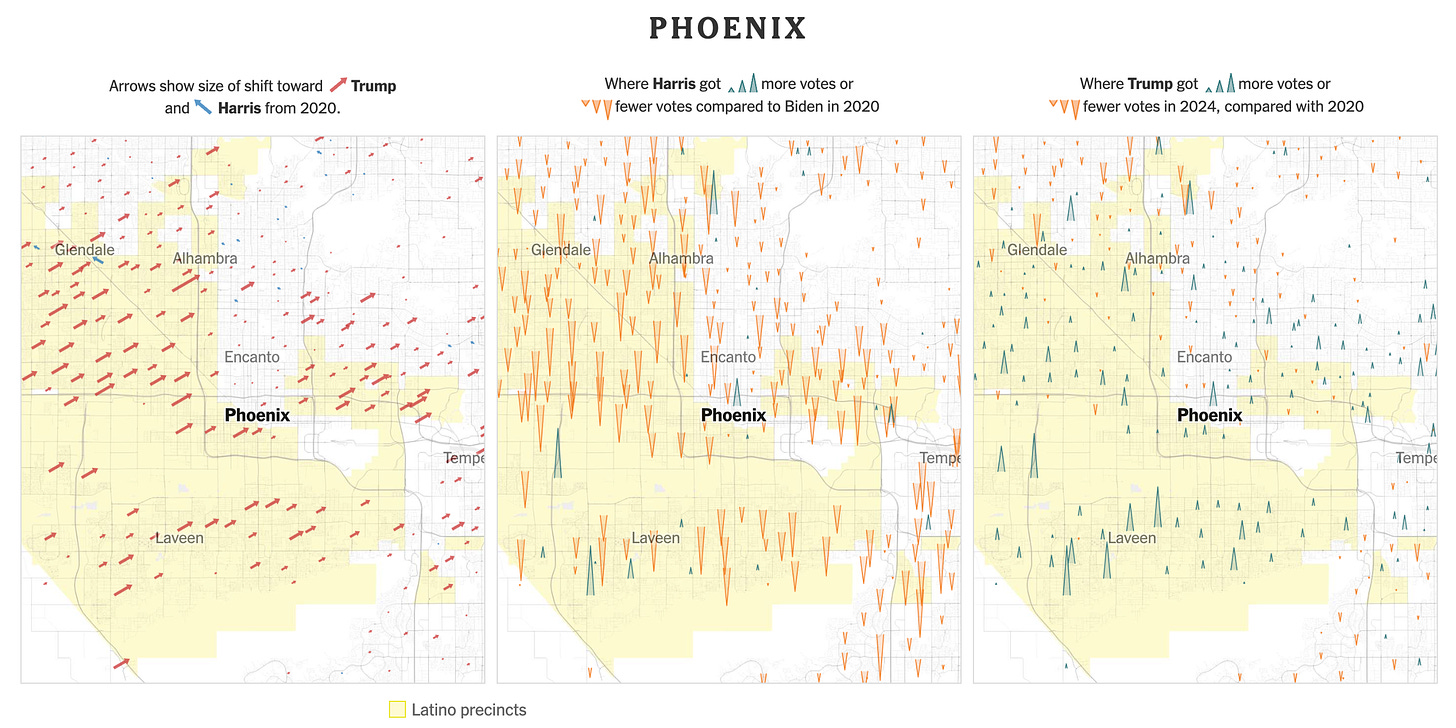
The year in review: Housing
It takes twice as many half-steps … The gubernatorial firing squad … And no sympathy for the evicted.
In a rare case of Republicans and Democrats successfully working together, Arizona’s lawmakers passed a group of laws to increase the state’s affordable housing stock this year.
The new policies work through state preemption, however, and most cities and towns don’t like being told what to do by their state legislators.
Proponents of the legislation argued housing reform has to happen at the local level. City and town councils decide zoning laws that determine what can be built and where, have the final say on new developments and can incentivize developers to build affordable housing.
And the numbers show the policies Arizona’s localities have now aren’t working. In Maricopa County, at least, the total number of housing units built decreased 25% in the past 12 years, per the Maricopa Association of Governments. About 26% of residential properties in the area are owned by investors or people who don’t live here year-round.
Most millennials can’t afford to buy a house here. And even the cost of renting an apartment has skyrocketed. In February, Attorney General Kris Mayes started a lawsuit against residential apartment landlords for an alleged scheme to illegally raise rents.
Litigation takes a long time. So the biggest hope for housing relief comes back to four major housing bills signed into law this year. Three of them go into effect in January:
HB2720: Municipalities with at least 75,000 people have to adopt codes allowing accessory dwelling units, or casitas, on lots zoned for single-family use by Jan. 1, 2025.
HB2721: Municipalities with at least 75,000 people must allow for the development of duplexes, triplexes and other multi-family home options on lots zoned for single-family use by Jan. 1, 2026.
HB2297: Municipalities with at least 150,000 people have to allow multifamily residential development on up to 10% of commercial, office or mixed-use buildings by Jan. 1, 2025. The law also includes language to speed up the zoning process.
SB1162: Municipalities have to install zoning code changes that speed up the approval process for construction. The localities also have to publish a housing needs assessment every five years, starting Jan. 1, 2025, that outlines the total need for additional housing through population and job growth data and how much of a locality’s land is zoned for housing.
Before any of those laws go into effect, localities are coming up with ways to lessen their impact.
This year’s housing bills are a tamer version of a similar set proposed in 2023 that the powerful lobbying arm of The League of Arizona Cities and Towns shut down. Even though lawmakers worked with the League to get this year’s bills passed with input from the state’s municipalities, cities and towns are being creative about twisting the laws’ language.
Scottsdale City Council members adopted ordinances last week limiting HB2297, despite warnings from House Majority Leader Leo Biasiucci1 that the changes defy new state law.
That law requires cities to allow the redevelopment of commercial space into housing on “not more than ten percent” of existing commercial space. Scottsdale adopted an ordinance to make the law apply to only 1% of commercial space.
It’s unclear if lawmakers will use their favorite punishment for cities that violate state law through Senate Bill 1487. It only takes one lawmaker to use that law to call for a state attorney general investigation which could result in the city losing its share of state-shared revenues.
Former Sen. Steve Kaiser, who backed most of 2023’s housing laws and was instrumental in getting this year’s bills passed with his lobbying firm Policy Forge, said an independent zoning law firm is issuing a legal opinion to clear up the law’s language so cities don’t take disparate interpretations of it. But he said lawmakers have plans in place to use 1487 if Scottsdale doesn’t follow the law.
Meanwhile, Gilbert strategically gave a special designation to its downtown area because HB2721 requires municipalities to allow multifamily development within one mile of a “central business district.” Gilbert’s town council gave that title to its heritage district, an area that has less than 1% of land open for development for multi-family units.
Even Phoenix Mayor Kate Gallego slammed the state’s new law allowing casitas on lots zoned for single-family use and said the state “steamrolled the countless hours our residents have contributed to thoughtful policy creation” and accused AirBNB lobbyists of writing the law.
The efficacy of those four new laws aside, it’ll be difficult to see the results if cities and towns minimize their intentions.
The results from 2024’s point-in-time count, which shows the number of people experiencing homelessness on a single night in January, showed a decrease in unsheltered homelessness and an increase in people in shelters throughout Maricopa County.
The same count in January 2025 could be much different.
This year, Maricopa County is set to break the record for the most evictions filed within a year, per the Phoenix New Times. The county’s justice courts have sent out 73,339 eviction filings through the end of October, and they’re concentrated in low-income areas.
The homelessness epidemic is set to get even more complicated after voters passed Proposition 312 this year. The new law will let property owners recoup costs for localities failing to enforce “public nuisance” laws like sleeping in public.
The convergence of the new state policy and the Supreme Court’s overturning of the Grants Pass ruling that barred cities from displacing people if they have nowhere else to go has led to a cascade of public camping bans across the state.
Housing insecurity and homelessness are different, yet converging issues, and studies show increasing the amount of housing in the area drives down housing prices, and subsequently the rate of people experiencing homelessness.
Kaiser said housing developers are already eyeing commercial lots as the housing bills that eliminate some zoning red tape go into effect this year. And there are plans in the works for housing bills next year to speed up the zoning approval process, produce more townhomes and condos and bring back the “YIGBY” bill: Yes in God’s Backyard, which failed last year. It would get rid of the zoning review process for housing on land owned by religious groups.
The former lawmaker turned housing lobbyist said he’s working on getting a housing caucus together among next year’s legislators.
Conservative beliefs in private property rights and liberals’ calls for housing parity make reform “transcend political parties,” Kaiser said.
But that reform has to transcend city and town resistance, too.
A change of heart: Gov. Katie Hobbs abruptly fired the retired judge who she hired to review Arizona’s lethal execution processes — and Attorney General Kris Mayes announced she’ll seek an execution for Aaron Gunches, who was scheduled to be executed in 2023, before Hobbs paused executions, per the Associated Press. The retired judge that Hobbs kicked off the execution review panel, David Duncan, told Fox10 that the governor didn’t like his findings that lethal injection would never be humane, nor his suggestion they use a firing squad instead, and he panned the governor for listening to the Department of Corrections’ word that it can execute people humanely rather than the independent opinion Hobbs had asked for.
"It is a very quick death, and it is one that is probably the most humane of it," Duncan said of the firing squad. "It also has the least botch rate. The botch rate for lethal injection is 7%."
Make Arizona Musky Again: After initially denying a committee chairmanship to Arizona House Freedom Caucus leader Joseph Chaplik, incoming House Speaker Steve Montenegro added another committee to this year’s roster: the House Regulatory Oversight Committee. Chaplik will lead the committee, which will mirror a committee in the Senate that President Warren Petersen calls Arizona’s “DOGE” committee, an homage to Donald Trump’s new Department of Government Efficiency, led by Elon Musk.
No cameras: The City of Glendale will no longer stream the portion of its meeting where normal folks can tell their city council what’s on their mind, the Republic’s Shawn Raymundo reports. The move comes after neighboring Surprise arrested a woman for criticizing the council during its “call to the audience” section, and critics accused the city of censoring its residents and critics.
Unlike city councils, we love hearing from you! When you upgrade to a paid subscription, you can drop us a message and join our community of commenters.
Out with the old: U.S. Rep. Raúl Grijalva is among the old guard Democrats that the new kids in Congress are gunning for, Politico reports. He’s the longtime “ranking member”2 on the Committee on Natural Resources, and he’s one of a few ranking members who are facing internal challenges from fellow Democrats this year. California Democrat Jared Huffman is vying for the job and says Grijalva’s absences3 and weak fundraising for the party make the Tucson Democrat a poor fit for the job.
They’re cops, not ICE: Local law enforcement in border towns are still figuring out how to implement Prop 314, the Secure our Border Act, which voters approved last month, the Nogales International’s Daisy Zavala Magaña writes. Not all of the provisions immediately go on the books, and police agencies are trying to balance utilizing some of the new tools for law enforcement without being forced to become immigration agents.
“Even if the people are here legally and they have their appropriate visa or green card, just that fear that you’re now inviting some immigration officers to come scrutinize your life,” Santa Cruz County Sheriff David Hathaway said. “So we do have that concern that it’ll create distrust with the Sheriff’s Office.”
Seems legit: The Arizona Corporation Commission voted to investigate its sole Democratic member, Anna Tovar, for allegedly violating executive-session confidentiality and disclosing confidential employment information. Commissioners directed their attorney, Thomas Van Flein, the former chief of staff to Paul Gosar, to lead the investigation, per the Republic’s Russ Wiles.
Cool map alert: The New York Times looked at 11 cities where Democrats lost ground this election cycle over 2020, including Phoenix. The map shows Democrats got trumped in Latino areas.
Send her to Mexico: Rumors are flying in the Mexican press that failed gubernatorial and U.S. Senate candidate Kari Lake could be the next U.S. ambassador to Mexico, Republic columnist Elvia Diáz notes. Meanwhile, she’s also in negotiations to host a show on far right cable television channel Newsmax, the Phoenix New Times’ TJ L'Heureux writes, citing Mediaite.
House Speaker Steve Montenegro asked outgoing lawmakers to clear out their offices today to make room for the new folks.
Outgoing Republican state Rep. Barbara Parker did not take the news well.
The freshman lawmaker sent a 2,000-word email to all lawmakers belittling the new leadership team as “inexperienced” and warning them that the earlier-than-usual move-out date could have “political and legal” repercussions.
But our favorite line has to be her concern that the media would find out that lawmakers are getting paid without actually working.
“I shudder to think of the headlines that might follow the people or media discovering that, humble as they are, paychecks are still being issued while the ability to do any significant legislative work has been severely curtailed by the new leadership,” she wrote.
CORRECTION: A previous version of this edition incorrectly identified Biasiucci as the House speaker. He’s the (outgoing) majority leader.
Ranking member is essentially the top member of the minority party on a committee.
Grijalva has been battling cancer and recently announced that he will retire after this term.











The elephant in the room for the housing issue, is that the majority of what is being constructed will not be available to those who truly need housing. How many luxury apartments (which is a laugh when you watch them being built) do we need? Before these bills passed, I asked if my legislator would rent a casita on her property to a Section 8 person. She hemmed & hawed and said that there's a lot of paperwork associated with that. DUH! But they are often the people who need housing security. We hear about owners of apartment complexes moving people out, slapping on new paint and perhaps a few new appliances, and jacking the rent up. And the former residents cannot afford to return.
While I own a house, the current rent around me is 4 times what I pay monthly in house payments. And building a casita on my lot is out of the question because I would lose the area where I have my garden. I do like fresh veggies, but I digress.
The other elephant is WATER so I hope you focus a lot more on that because our legislators don't seem to grasp how crucial it is to our survival.
Kate is right about Airbnb. If the legislature changed the wording of the short term rental legislation to “may” allow instead of “must” for cities and towns to decide we could see 20% of, virtually, commercial properties in neighborhoods either rented with a 30 day minimum or sold. That would immediately add inventory to rent or buy. Airbnb knows how to grease those palms.